Yasar Yakis
A fortnight after the major earthquake that plunged Turkiye into disaster, the government continues to face some potentially insurmountable problems. The first problem is that it has not yet been able to properly streamline its aid activities. The government praises itself only with miraculous cases of survival as we enter the third week since the catastrophe.
There is little excuse for the collapse of public buildings such as hospitals or schools that were built after the most recent major earthquake in 1999. New norms were introduced after that earthquake and the controls were made stricter, but these measures proved to be insufficient. The municipal authorities that approved the conformity to the rules of such buildings have to be held responsible for their mistakes. A new draft law designed to declare yet another grace period for noncompliant buildings was on the agenda of the government and was going to be debated in the coming days had Mother Nature not intervened.
Both the Turkish people and the international community have been mobilized to help the survivors, but a deep divide is growing in the country between Turkiye’s state organs and voluntary aid organizations. The government has tried to monopolize the aid work and restrict the work of private rescue teams, which were performing fairly well. Some of them have proven their efficiency, but the government does not want them to perform better than itself. Nationalist Movement Party leader Devlet Bahceli, who is the government’s unofficial partner, furiously scolded all private rescue teams and called them imposters.
Little attention was paid to the recruitment of personnel for the government agencies that were going to assume responsibility in the field of aid works, but their efficiency has proven to be limited. Furthermore, the government monopolized the opening of bank accounts for the benefit of survivors. This has restricted the contributions made by individuals. The state of emergency declared by Turkish President Recep Tayyip Erdogan will, of course, restrict the opposition parties’ election campaigns. However, the government’s mismanagement of post-earthquake activities may counterbalance the negative impacts of any restrictions that the opposition parties might face.
The second problem is the possibility of a postponement of the general election that was provisionally scheduled for May 14. Presidential adviser Bulent Arinc came up with a proposal to postpone the forthcoming vote, even though the Turkish Constitution does not allow such a move except in the case of war. Arinc opined that the constitution was not a sacred text and that the Supreme Electoral Council could rule to hold the elections on another date.
Erdogan knows that the earthquake has complicated his plans for the election campaign. He said he needed a full year to make Turkiye stand up again. Arinc’s view that the constitution was not a sacred document may reflect Erdogan’s wish to straighten the situation as much as possible or at least to dissipate the prevailing distressing situation before the election. The third problem that Turkiye is faced with is the ethnic or cultural identity of Antakya. This province became part of Turkiye in 1939. After the collapse of the Ottoman state, the League of Nations placed Syria under the French mandate. France decided to rule Syria as six semi-autonomous republics. They were the republics of Damascus, Greater Lebanon, Alawites, Jebel Druze, Aleppo and Antakya.
Mustafa Kemal Ataturk, then-president of the Republic of Turkiye, urged that a referendum be held to determine the future status of Antakya. Syria claimed that the referendum that was held under League of Nations supervision was not transparent and that the Turkish soldiers that were brought to Antakya before the referendum should not have been allowed to vote. The referendum was held and the League of Nations decided that Antakya had to be transferred to Turkiye. Furthermore, this was an international transaction between Turkiye and France before Syria became an independent state.
Syria has never recognized Antakya’s annexation to Turkiye. In maps printed in Syria, this province is still shown as a Syrian province, but no other nation recognizes it as such. Now, with millions of Syrians having moved to Turkiye as a result of the crisis of the last decade, the ethnic composition of Antakya has been dramatically altered. With this month’s devastating earthquake having affected several Turkish provinces, it is unclear what sort of ethnic composition will emerge in Antakya after the dust settles. Syrian citizens have already initiated a campaign of graffiti on the walls in downtown Antakya, claiming that the province belongs to them. This may turn into a new time bomb that causes strains between Ankara and Damascus.
In a catastrophe of this size, mistakes may be made by all sides, but this should not penalize either the government or the well-performing private aid associations that have proved to be reliable actors.







